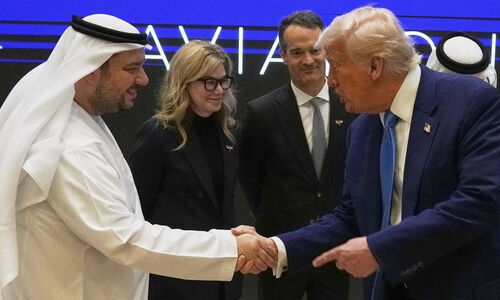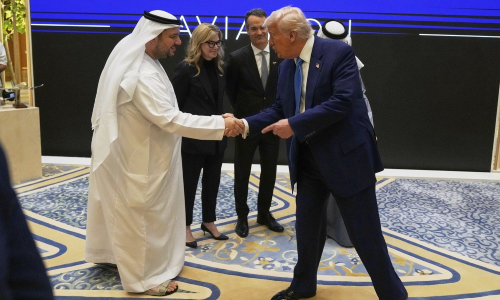Trump Embarks on Multi-Billion Dollar Mission in the Middle East
«The Art of the Deal» – that could be the subtitle of US President Donald Trump’s four-day visit to the Arabian Gulf region. Alongside the fireworks of numbers presented by both sides, some of the President's geopolitical remarks are likely to have caught the attention of the banking sector.
Written by Gérard-Al-Fil, Dubai
In addition to politics and military partnerships, large-scale financial deals were on the agenda during Trump’s Middle East tour from March 13 to 16, which included stops in Saudi Arabia, Qatar, and the United Arab Emirates (UAE).
Saudi Arabia: During Trump’s visit, US companies and those in the Kingdom agreed on deals worth $300 billion. A group of tech firms – including Google, Oracle, and Salesforce—will invest $80 billion in high-tech centers and in US-Saudi joint ventures. Additionally, the Saudis plan to channel $600 billion in petrodollars from their sovereign wealth fund PIF into the US economy. According to Saudi Crown Prince Mohammed bin Salman, this amount could be increased to a whopping one trillion dollars.
Qatar: State-owned airline Qatar Airways will purchase Boeing aircraft worth $200 billion – a blessing for the US aircraft manufacturer from Seattle, which has recently made negative headlines due to tragic accidents involving its Boeing 737 model. Furthermore, the Qatar Investment Authority (QIA), the state sovereign wealth fund, has committed to investing $500 billion in the US over the next decade.
UAE: In Abu Dhabi, the final stop on Trump’s Gulf tour which ended Friday, both sides signed deals totaling $200 billion. State-owned Etihad Airways, for example, will purchase 28 Boeing 787 Dreamliners and 777 aircraft and invest in research and development of artificial intelligence (AI) in both countries. A US-UAE AI campus was also established.
A $60 billion package cemented the partnership between US oil giant Exxon Mobil Corp. and Emirati company Adnoc. This marked the first visit by a US head of government to Abu Dhabi in 17 years and only the second official White House visit to the UAE ever.
President Trump is greeted by a participant as he attends a business meeting and roundtable at Qasr Al Watan in Abu Dhabi (Image: Keystone)
With this trip, Trump also aimed to counter a rival from East Asia. China overtook the US and India ten years ago as the largest trading partner of both Saudi Arabia and the UAE, and continues to expand its economic influence in the region.
The announced lifting of US sanctions on Syria could pave the way for bank financing to support the reconstruction of the war-torn country.
Trump's remark that his administration is nearing a nuclear energy deal with Iran is also likely to have grabbed the attention of financial institutions. As long as harsh US and U.N. sanctions remain in place against the Islamic Republic, financing involving Iranian participation in the Gulf is not feasible—let alone any banking business with Tehran.




























